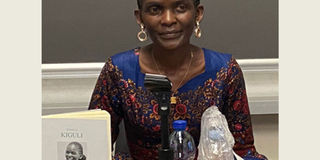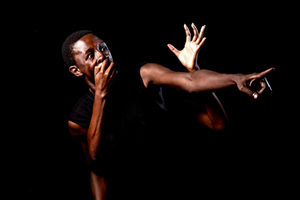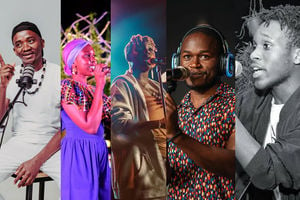
Prof Susan Kiguli, Ugandan’s celebrated poet, fully supports the idea of using local dialects, but fears its potential to alleniate Ugandans from shared meaning. PHOTO/courtesy
In 2019, Ugandan poet, Ngobi Kagayi hoisted the cudgels. He was officially on a war footing.
“Time to take this argument to the bar. Enough of the Facebook posts... Let us have this debate face-to-face. English language, or the ‘local dialects’, which is (are) best suited to the growth and development of poetry in Uganda?” he said as he sounded the war drums.
“Last year, Prof Timothy Wangusa was hosted at Goethe Zentrum by Femrite to engage the public audience through a reading from his most recent book release: a bi-lingual poetry collection in Lumasaba and English language. He told us about the creative process he undertook to write the book and why it took him this long to produce his first poetry collection in his mother tongue.
“This conversation of ‘The Language(s) of Ugandan Literature’ is important. It began way back, and it still rages on. At least ko, like Susan Kiguli would put it, this time the ‘Performer is the Critic’,” he added.
A debate was held at Rock Bar: English versus local dialects. Unfortunately, there was no consensus on which form of communication works best in lifting the arts in Uganda.
Post-colonial literature
As Kagayi rightly said, the discussion around which language should be used in the service of literature has been protracted. This is partly thanks to literature being an influential institution in postcolonial Africa. With many of the independence leaders being lettered, this influence was felt in many a publication and thereby stoked its controversy regarding how best it could be used.
There was the concept of “Négritude” as written about by Senegalese independence leader Léopold Sédar Senghor as “the sum of the cultural values of the black world as they are expressed in the life, the institutions, and the works of black men.”
Also, there was “Consciencism: Philosophy and Ideology for De-Colonisation and Development with particular reference to the African Revolution” by Kwame Nkrumah, which offered the intellectual framework for what he termed “Positive Action.”
Kenneth Kaunda wrote about humanism, Mobuto Sese Seko touted authenticity, while Julius Nyerere extolled the virtues of Ujamaa, as he somewhat strangely published Juliasi Kaizari, his translation of Shakespeare’s Julius Caesar in Kiswahili in 1963. Six years later, in 1969, the Oxford University Press published Mabepari wa Venisi, his translation of The Merchant of Venice.
African writers were African leaders as this duality served as a motivation to their plans to build modern democratic societies outside the gilded cage of the colonial state. Nonetheless, a great number of African writers saw their works banned by these lettered leaders. Many others were jailed, killed and hounded into involuntary exile. As to the latter, Dennis Brutus, Festus lyayi, Abdelatif Laabi, Steve Biko, Ken Saro-Wiwa Jack Mapanje, Micere Mugo, Keorapetse Kgositsile, Maina wa Kinyati, Ngugi wa Thiong’o, Nawal El Saadawi, and Wole Soyinka, among others, were some prominent examples.
Headmaster’s language
While the revolution was not being televised, discussions around language as a literary torch raged like an African bush fire. Prof Susan Kiguli, an icon of Ugandan poetry, met with Graham Mort of Lancaster University and voiced her views on this matter.
“I am afraid to admit that the realisation of English being a colonial language, the way I know it now, came rather late in life. It sharply dawned on me in my first year at university, never mind that when the National Resistance Movement took power in Uganda in 1986, the government talked about it a lot,” she said.
She added: “It did not keenly sink in, until we discussed at university, in different classes, the impact of expatriate writing and the question of language that Ngũgĩ popularised. It was even more painful to realise on my first visit to Britain in 1995 that the colonial language had many dialects and accents and I had to struggle to understand them all!”
The professor of English Literature at Makerere University, says: “On the part of English being a necessary lingua franca in Uganda, that fact trickled into my life slowly over the years. It is the language that we used in school and which seemed to be understood by people from different parts. It was the language of the headmaster (who was both black and Ugandan) at the primary boarding school I attended; we deemed it the headmaster’s language because he issued the punishments for those who did not speak it well.”
Clearly, as Kiguli alluded, English is a language spoken by many Ugandans amidst a tower of Babel of dialects. To preclude its use would alienate a host of Ugandans from the shared meaning that comes with the use of a common tongue. Still, there are neo-colonial implications, which make English a literary mainstay.
Love Me In English
In 2022, Bridget Ankunda’s Don’t Love Me In English hit the book stalls like a tidal wave. It ran in tandem with Kagayi’s promotion of local dialects over English. However, Ankunda’s poetry collection failed to head off the bias towards English. Why? Ugandans are products of their past. Our colonial masters, the British, tacitly endorsed the Rooseveltian aphorism “speak softly and carry a big stick; you will go far.”
So their idiolects -the speech habits peculiar to a particular person, as shaped by their ethnic backgrounds, all but vanished. It, thus, became a scandal to love someone in any language but English. This bias influences what Ugandans read.
To abandon English or not?
Ugandans largely prefer to read religious books, newspapers, inspirational or self-help books, and these are majorly in English. Books popular outside these genres are also in English. We are talking Manchester Happened by Jennifer Nansubuga Makumbi, Tropical Fish by Doreen Baingana and Abyssinian Chronicles by Moses Isegawa, among others. It will be a while before Kagayi’s literary nirvana takes shape; but to abandon it would be to abandon our indigeneity.




